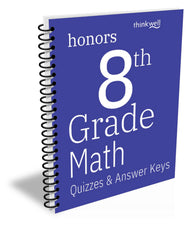










Honors Prealgebra (8th Grade Math) Online Course
$169.00
Challenge your student with Honors Prealgebra
Thinkwell’s Honors Prealgebra is designed for motivated learners who are ready to go beyond the basics. With 350+ engaging video lessons from award-winning teacher Edward Burger, plus rigorous practice, review, worksheets and automatically graded exercises, students develop the problem-solving skills and deeper understanding they’ll need to excel in Algebra 1 and beyond.
Everything is online and ready to go at your own pace, with printed companion books available for a hands-on option. Preview Volume One.
⭐ New! Studdy Buddy — your student’s built-in math tutor. Step-by-step help is always just a click away, included free with every course. Learn more about Studdy Buddy here.
Homeschool families love the flexibility to start anytime and progress as quickly as their student is ready. Honors Prealgebra is perfect for advanced middle-schoolers seeking an extra challenge, or as a springboard into Honors Algebra 1.
Give your student the challenge and confidence they need to thrive in higher-level math.





 When it comes to learning Prealgebra, there's no substitute for putting pencil to paper. This companion book to Thinkwell's Honors Prealgebra course includes:
When it comes to learning Prealgebra, there's no substitute for putting pencil to paper. This companion book to Thinkwell's Honors Prealgebra course includes:
 When it comes to learning Prealgebra, there's no substitute for putting pencil to paper. This companion book to Thinkwell's Honors Prealgebra course includes:
When it comes to learning Prealgebra, there's no substitute for putting pencil to paper. This companion book to Thinkwell's Honors Prealgebra course includes:




